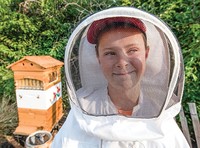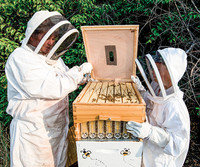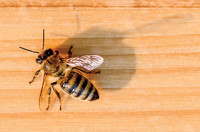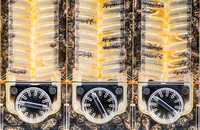Cloudy, 31° F
“Colony collapse disease led to more people wanting to ensure pollinators were available. And that led to more hobby beekeepers,” said Brenda Eden, area 4-H leader and Honey Hill Farm beekeeper.
Eden has a small, but determined group of young …
This item is available in full to subscribers.
The Powell Tribune has expanded its online content. To continue reading, you will need to either log in to your subscriber account, or purchase a subscription.
If you are a current print subscriber, you can set up a free web account by clicking here.
If you already have a web account, but need to reset it, you can do so by clicking here.
If you would like to purchase a subscription click here.
Please log in to continue |
|




The recent phenomena of hive collapse disease and the education about pollinators that followed is paying off in sweet dividends.
“Colony collapse disease led to more people wanting to ensure pollinators were available. And that led to more hobby beekeepers,” said Brenda Eden, area 4-H leader and Honey Hill Farm beekeeper.
Eden has a small, but determined group of young hobbyists who raise bees, produce honey and are learning the business in the Powell area. Eden finds being an educator rewarding despite the fact she’s training future competition. Last year Eden and her granddaughter, Cricket Hildebrandt, produced about 1,500 pounds of honey, selling their product at local craft fairs.
According to the USDA, hive collapse disease has decreased 40 percent since 2015.
Curtis Muecke, a fourth-grade student at Parkside Elementary, has been getting serious about his new hive. He loves watching them at work, but not quite as much as he likes honey.
“I like it by the spoonful,” Curtis said.
His mother, Christy Muecke, thinks it’s important to teach children where their food sources originate. They raise turkeys and have a large garden and apple trees on their acreage west of Powell. Now they have bees to help pollinate the garden, the neighboring bean fields and for a sweet treat. Their hive produces about 70 pounds of honey a year.
“We wanted the bees. We have a garden and a mini orchard. And we thought it would be a good education,” Muecke said.
In their second year of beekeeping, the Mueckes decided to get an EZ Bee hive, made in the U.S., to capitalize on the educational opportunities. The hive has easy to remove windows, exposing the often hidden world of honeybees.
It also utilizes a unique system that dispenses the honey without disturbing the bees. Keeping them happy and healthy is important for honey production and to keep down the costs.
The bees cost about $45 a pound, she said. There are other expenses, including the hive and the beekeeper suits.
Eden’s 4-H group not only meets to share their experiences, but they also learn to keep their own financial books. One of her proteges has figured out how to save the cost of the bees for his hive: Reese Lowe, son of Sara and Wayne Lowe in Garland, captured his own swarm of bees. The swarm was about 10-feet up in a tree so the Lowe family cut down the branch and, against what would seem to be common sense, they shook it.
“They naturally go right into the box,” Eden said. “When they’re swarming, they’re only concerned about finding a new home for their queen,” she said. She even suggested that catching a swarm could be done in short sleeves, although she hasn’t tried. The beekeeper confessed she is afraid of being stung.
“A lot of people are intimidated by bees. You can see our kids aren’t scared of them, but bees aren’t for everybody,” Muecke said.
Ryan Muecke, Curtis’ father, is the project photographer, according to Christy.
“He stands back and takes our pictures,” she said as she pointed in a safe direction. “He watches them from a distance.”
Regardless of their roles in the process, Curtis’ parents want to stress the educational advantages.
“Food doesn’t come from a grocery store. That’s where they sell it, but it’s grown or made somewhere else. Kids need to understand it’s a big process to make honey, raise animals or grow produce,” Muecke said.
Curtis is very responsible in all of his pursuits, according to his mother, and the hive has been a great learning opportunity.
“I’ve always been fascinated with how hard they work,” Curtis said of the bees.
“It’s something not every kid gets to see,” Muecke said.
In their second year with a hive, they’re all still learning. Curtis is figuring out a science project of his own: how many spoons of honey he can eat.
“He hasn’t figured out that theory yet,” his mother said.